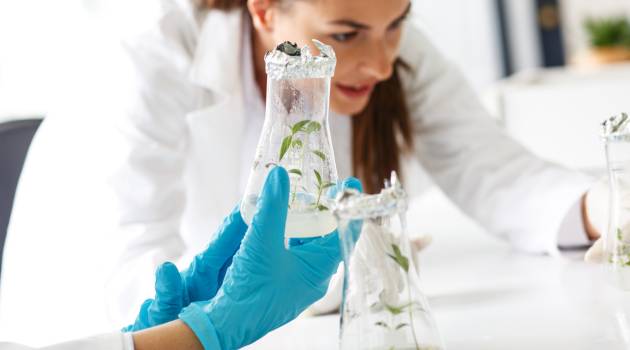In the quest for sustainable and efficient agricultural practices, biotechnology has emerged as a powerful tool. Agriculture biotechnology involves the application of scientific principles and techniques to manipulate living organisms, such as plants, animals, and microorganisms, to enhance agricultural productivity, improve crop traits, and address various challenges faced by farmers.
What is Biotechnology?
Biotechnology is a field of science that applies biological processes, organisms, or systems to develop and create innovative products, technologies, and solutions. It involves utilizing living organisms, such as bacteria, plants, and animals, along with their cellular and molecular components, to develop and improve various aspects of human life, including healthcare, agriculture, industry, and environmental sustainability.
Understanding Biotechnology in Agriculture:
Agricultural Biotechnology encompasses a wide range of techniques and applications. It involves utilizing genetic engineering, molecular biology, tissue culture, and other scientific methods to modify plants, animals, and microorganisms for specific agricultural purposes. These modifications can be aimed at enhancing crop yield, improving nutritional content, developing pest and disease resistance, and reducing the environmental impact of farming practices.
What are the Benefits of Agricultural Biotechnology?
Agricultural biotechnology brings several benefits to the table, including:
- Enhanced Crop Traits: Through genetic engineering, biotechnology allows the introduction of desirable traits in crops, such as improved yield, disease resistance, and tolerance to environmental stresses.
- Increased Food Production: Biotech crops can lead to higher crop yields, ensuring a more abundant and secure food supply for the growing global population.
- Pest and Disease Management: Biotechnology enables the development of genetically modified crops with built-in pest and disease resistance, reducing the reliance on chemical pesticides and minimizing environmental impact.
- Nutritional Improvements: Biotechnology can enhance the nutritional content of crops, addressing nutrient deficiencies and improving the quality of food. It enhances their nutritional value to address deficiencies in specific regions or populations. For instance, biofortified crops can be developed to provide higher levels of essential vitamins and minerals, combating malnutrition and improving human health.
- Environmental Sustainability and Resource Efficiency: Biotechnology also contributes to environmental sustainability in agriculture. By developing crops that are more resistant to environmental stresses, such as drought or salinity, farmers can reduce water usage and improve resource efficiency. Additionally, biotechnology-driven approaches enable the development of crops with increased nitrogen-use efficiency, minimizing fertilizer runoff and reducing environmental pollution.
How is Biotechnology Used in Agriculture?
Biotechnology is employed in various ways in agriculture:
- Genetic Engineering: Biotechnology enables scientists to genetically modify crops to produce higher nutrient content, which in turn reduces the reliance on synthetic fertilizers. Through genetic engineering techniques, researchers can introduce specific genes into crops, giving them new traits or characteristics that enhance nutrient uptake, improve nutrient utilization efficiency, and develop crops with inherent resistance to nutrient deficiencies. This approach has the potential to address malnutrition challenges and increase food security.
- Tissue Culture: Plant tissue culture is another important biotechnological technique used in agriculture. It involves growing and propagating plants in a controlled laboratory environment using small tissue samples. This technique allows for the rapid and efficient production of disease-free plants, the preservation of valuable genetic resources, and the selection of desirable traits through careful manipulation of plant cells and tissues.
- Marker-Assisted Selection: Biotechnology enables the identification and selection of desired traits in plants using molecular markers, leading to more efficient breeding programs.
- Microbial Applications: Agri biotech utilizes beneficial microorganisms for bio fertilizers, biopesticides, bio insecticides, biostimulants, bio fungicides, bionematicides, organic fertilizers, plant growth regulators, and other products and promotes plant growth and health.

Biotechnology Applications in Agriculture:
Beyond biotechnology in crop improvement, biotechnology for agriculture finds applications in:
- Animal Agriculture: where biotechnology is used for animal breeding, disease diagnosis, and improving animal health and productivity.
- Precision Agriculture: Biotechnology, combined with data analytics and remote sensing, enables precision farming practices, optimizing resource utilization and minimizing waste.
How Has Biotechnology Improved Farming and Modern Agriculture?
Agri-biotechnology has had a transformative impact on farming and modern agriculture:
- Increased Productivity: Biotech crops with improved traits and higher yields have significantly increased agricultural productivity, helping meet the demand for food and fiber.
- Reduced Environmental Impact: Biotech agriculture has reduced the reliance on chemical inputs, leading to decreased pesticide usage, minimized soil erosion, and lowered greenhouse gas emissions.
- Enhanced Crop Resilience: Biotech crops with traits such as drought tolerance and disease resistance have improved the resilience of crops, enabling them to withstand adverse conditions and thrive.
Examples of biotechnology in agriculture
Biotechnology has made significant advancements in the field of agriculture, offering a range of innovative solutions to address various challenges faced by farmers. Biotechnology has facilitated the development of biofertilizers and biopesticides that leverage the power of beneficial microorganisms. Biotechnology-driven fertilizer production offers several environmental benefits. Microbial-based fertilizers contribute to improved soil structure and nutrient cycling, reducing nutrient runoff and its associated pollution. Microbial-based biofertilizers containing beneficial bacteria or fungi are used to enhance nutrient availability and promote plant growth. These examples include:
- Rhizobium Biofertilizer: Rhizobium bacteria form a symbiotic relationship with legume crops, fixing atmospheric nitrogen and enhancing soil fertility.
- Baculovirus Biopesticide: Baculoviruses are used as biopesticides to control insect pests selectively, offering an environmentally friendly alternative to chemical pesticides.
Conclusion:
Biotechnology has ushered in a new era of possibilities in agriculture. Its benefits, applications, and examples showcase its potential to address global challenges in food production, resource efficiency, and environmental sustainability. By harnessing the power of biotechnology, we can continue to improve farming practices, enhance crop traits, and create a more resilient and sustainable
As we move forward, the continued exploration and responsible adoption of biotechnology in agriculture can play a significant role in meeting the growing demand for food, improving farmer livelihoods, and creating a more sustainable and resilient agricultural system.






